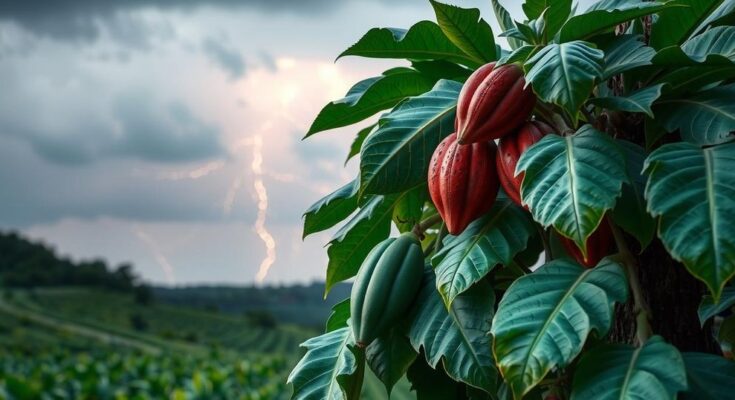Climate change has adversely affected cocoa production in West Africa, precipitating a rise in cocoa prices due to unfavorable growing conditions, including extreme heat and irregular rainfall. The impact threatens both the quality and quantity of cacao harvests, with serious implications for farmers’ livelihoods. A combination of climate extremes and external factors has resulted in soaring cocoa prices on global markets, raising concerns about the future of chocolate production.
Climate change has significantly impacted cocoa production, particularly in West Africa, which is responsible for approximately 70% of global cacao supply. Researchers highlighted that extreme temperatures and unusual rainfall have exacerbated harvest difficulties, leading to increased cocoa prices. A study by Climate Central reveals that the frequency of extreme heat above 32 degrees Celsius has risen, affecting major producing countries such as Ivory Coast and Ghana, where temperatures surpassed this threshold for at least 42 days in 2022.
The increasing heat threatens both the quantity and quality of cacao harvests, while additional factors such as disease, rainfall irregularities, and illegal activities also contribute to rising cocoa prices. According to a report by Christian Aid, weather extremes in West Africa have fluctuated dramatically, with farmers experiencing both excessive rain followed by drought conditions. Osai Ojigho, director of policy and public campaigns at Christian Aid, emphasized the importance of cacao farming as a livelihood for vulnerable populations, highlighting the dire repercussions of climate change on these communities.
The combination of failed harvests and climate challenges has caused cocoa prices to soar on commodity markets, with New York cocoa price reaching over $10,000 per tonne recently. Professor Narcisa Pricope of Mississippi State University underscored the existential threat posed to cacao crops due to increasingly arid conditions, noting that over three-quarters of Earth’s land has experienced heightened dryness. Pricope advocate that collective global action is essential not only to safeguard chocolate production but also to preserve essential ecological systems worldwide.
In conclusion, climate change poses a significant threat to cocoa production in West Africa, driving both the decline in harvest quality and quantity. As cacao farmers contend with rising prices, extreme weather patterns, and challenging conditions, the implications of these changes extend beyond chocolate supply to underscore broader concerns regarding agricultural sustainability and the livelihoods of vulnerable populations. Addressing these climate-related challenges is crucial for future generations and the planet’s ecological health.
Original Source: www.straitstimes.com




